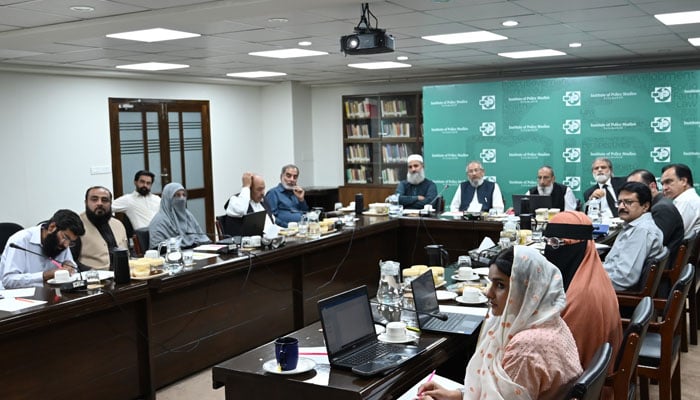Call for stronger Shariah governance framework for FIs
Islamabad:Urgent dedicated primary legislation, swift adoption of Accounting and Auditing Organisation for Islamic Financial Institutions (FIs) standards tailored to local financial context, and the establishment of a stronger Shariah governance framework are direly needed for the sustainable and credible growth of Islamic banks and non-bank financial institutions in Pakistan, experts said during a discussion on Monday.
However, this requires coordinated efforts across the regulatory, legal, and institutional fronts, as no financial framework operates in isolation, according to them. The event, titled ‘Towards a Shariah-Based Islamic Finance Ecosystem in Pakistan’ was hosted by the Institute of Policy Studies to discuss the legal framework for Islamic banks and non-bank financial institutions.
Key speakers included Justice Dr Syed Muhammad Anwer, aalim judge of the Federal Shariat Court, Tariq Naseem, head of Islamic Finance Department at SECP, Tauseefur Rahman, managing executive, SECP, and Dr Muhammad Ayub, former director, Research and Training, Riphah Centre of Islamic Business. Tariq Naseem elaborated on a proposed legal framework for non-bank financial institutions, noting that the sector’s growth remains stunted by the absence of a comprehensive and dedicated structure.
Dr Ayub provided a comparative analysis of the Shariah governance frameworks issued by the State Bank of Pakistan. He highlighted how legal and regulatory gaps in Shariah governance have allowed compromises in Islamic banks’ operations, pointing to the urgent need for systemic overhaul.
Justice Dr Syed Anwer underscored the need for a well-crafted legal framework that ensures both regulatory clarity and adherence to Shariah principles in the Islamic financial sector. Building on the presentations, the speakers accentuated the distinction between Shariah-compliant and Shariah-based finance with a suggestion to move beyond surface-level compliance toward a truly ethical, holistic financial system grounded in Islamic principles.
They also highlighted Pakistan’s untapped potential as a regional hub for Islamic finance, which is projected to grow to nearly $7 trillion globally by 2027. The experts said the SBP and SECP should establish rigorous criteria and a selection mechanism for Shariah scholars with expertise in Islamic law and finance to strengthen the governance and legal framework for both banks and non-bank financial institutions.
-
 'Mortified' Princess Eugenie, Beatrice Plan Interview To Finally Speak Truth In Sarah Ferguson, Andrew-Epstein Scandal
'Mortified' Princess Eugenie, Beatrice Plan Interview To Finally Speak Truth In Sarah Ferguson, Andrew-Epstein Scandal -
 Lewis Hamilton Spent Years Trying To Catch Kim Kardashian's Attention?
Lewis Hamilton Spent Years Trying To Catch Kim Kardashian's Attention? -
 Royal Strategy Revealed As King Charles, Prince William Issue Statements On Andrew Row
Royal Strategy Revealed As King Charles, Prince William Issue Statements On Andrew Row -
 Inside Will Smith's Struggle To Revive His Career After Infamous Oscar Incident
Inside Will Smith's Struggle To Revive His Career After Infamous Oscar Incident -
 What’s Coming Out Of Meghan Markle’s War Against Prince William? Inside People’s Unease
What’s Coming Out Of Meghan Markle’s War Against Prince William? Inside People’s Unease -
 Australia Seeks Urgent Meeting With Roblox Over 'Disturbing' Content Complaints
Australia Seeks Urgent Meeting With Roblox Over 'Disturbing' Content Complaints -
 Epstein Case: Ghislaine Maxwell Invokes Fifth, Refuses To Testify Before US Congress
Epstein Case: Ghislaine Maxwell Invokes Fifth, Refuses To Testify Before US Congress -
 Ferrari Luce: First Electric Sports Car Unveiled With Enzo V12 Revival
Ferrari Luce: First Electric Sports Car Unveiled With Enzo V12 Revival -
 Chappell Roan Parts Ways With Wasserman Music Over CEO's Ties With Epstein
Chappell Roan Parts Ways With Wasserman Music Over CEO's Ties With Epstein -
 Andrew Mountbatten Windsor Publically Shamed After Brother And Nephew Change Decades Old Royal Rule
Andrew Mountbatten Windsor Publically Shamed After Brother And Nephew Change Decades Old Royal Rule -
 Jon Stewart On Bad Bunny's Super Bowl Performance: 'Killed It''
Jon Stewart On Bad Bunny's Super Bowl Performance: 'Killed It'' -
 Savannah Guthrie Receives Massive Support From Reese Witherspoon, Jennifer Garner After Desperate Plea
Savannah Guthrie Receives Massive Support From Reese Witherspoon, Jennifer Garner After Desperate Plea -
 Celebrities Take Sides As Brooklyn Beckham’s Feud With David, Victoria Heats Up
Celebrities Take Sides As Brooklyn Beckham’s Feud With David, Victoria Heats Up -
 Prince Harry Reacts As Beatrice, Eugenie's Names Surface In Epstein Emails
Prince Harry Reacts As Beatrice, Eugenie's Names Surface In Epstein Emails -
 Cyprus Joins European AI Race: What It Means For Greek LLMs And Regional Innovation
Cyprus Joins European AI Race: What It Means For Greek LLMs And Regional Innovation -
 Amazon Soon To Launch 'AI Content' Marketplace, Says Report
Amazon Soon To Launch 'AI Content' Marketplace, Says Report




